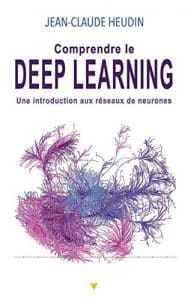Vous cherchez un livre sur le deep learning mais vous n’avez pas encore décidé lequel acheter?
Pour cette raison Les Livres a élaboré pour toi une liste des livres à lire absolument achetables online.
[acf field=”intro”]
Sommaire
- 1 🏆 Meilleurs livres sur le deep learning 2024: comparatif et avis
- 1.1 Cracking The Machine Learning Interview
- 1.2 Deep Learning with Python (English Edition)
- 1.3 Python pour la Finance et le Trading algorithmique (2ème édition): Machine Learning, Deep Learning, analyse de séries temporelles, gestion des risques ... application en live trading sur MetaTrader™ 5
- 1.4 Deepmath - Mathématiques (simples) des réseaux de neurones (pas trop compliqués): Algorithmes et mathématiques
- 1.5 Deep Learning
- 2 🥇Meilleuer livre sur le deep learning: l’incontournable
🏆 Meilleurs livres sur le deep learning 2024: comparatif et avis
Cracking The Machine Learning Interview
- Suri, Nitin (Auteur)
"Crainging The Machine Learning Interview" is a book written by Nitin Suri. It is a comprehensive guide for individuals preparing for machine learning interviews. The book covers various topics such as data preprocessing, feature selection, model training, and evaluation. It also provides sample interview questions and solutions for better understanding. The book aims to assist readers in understanding and mastering the key concepts and techniques required for machine learning interviews.
Deep Learning with Python (English Edition)
- Chollet, Francois (Auteur)
"Deep Learning with Python (English Edition)" by Francois Chollet is a comprehensive book that provides a practical introduction to deep learning using Python programming language. The book covers various deep learning techniques, including convolutional networks, recurrent networks, and reinforcement learning. Chollet, who is the creator of the popular deep learning framework Keras, guides readers through the fundamentals of deep learning and explains how to build and train deep neural networks. The book also explores advanced topics such as generative models, transfer learning, and domain adaptation. The book includes numerous code examples and real-world applications, making it accessible to both beginners and experienced practitioners. It provides a solid foundation in deep learning concepts and techniques, equipping readers with the knowledge and tools needed to apply deep learning to their own projects. Overall, "Deep Learning with Python (English Edition)" is a valuable resource for anyone who wants to learn and understand deep learning using Python.
Python pour la Finance et le Trading algorithmique (2ème édition): Machine Learning, Deep Learning, analyse de séries temporelles, gestion des risques ... application en live trading sur MetaTrader™ 5
- Inglese, Lucas (Auteur)
La deuxième édition du livre "Python pour la Finance et le Trading algorithmique" de Lucas Inglese se concentre sur l'utilisation de Python dans le domaine de la finance et du trading. Le livre couvre plusieurs sujets avancés tels que le Machine Learning, le Deep Learning, l'analyse des séries temporelles et la gestion des risques. L'auteur commence par expliquer les bases de Python et comment l'utiliser pour analyser les données financières. Il passe ensuite à des sujets plus avancés, en présentant différentes techniques de Machine Learning et de Deep Learning utilisées dans la finance. L'auteur explique comment utiliser ces techniques pour prédire les mouvements du marché, détecter des modèles dans les données et générer des signaux de trading. Le livre offre également des conseils sur la gestion des risques, en expliquant comment calculer et gérer les risques associés aux transactions financières. L'auteur présente des outils avancés pour mesurer et réduire les risques, tels que la Value at Risk (VaR) et l'Expected Shortfall. Une partie importante du livre est consacrée à l'utilisation de Python dans le trading en temps réel sur la plateforme MetaTrader™ 5. L'auteur explique comment utiliser l'API de MetaTrader™ 5 pour connecter Python à la plateforme et envoyer des ordres de trading en temps réel. Il montre également comment analyser les données en temps réel et prendre des décisions de trading basées sur ces données. En résumé, "Python pour la Finance et le Trading algorithmique" est un livre avancé qui présente les techniques de Machine Learning et de Deep Learning utilisées dans la finance et le trading. Il offre également des conseils sur la gestion des risques et explique comment utiliser Python pour le trading en temps réel sur la plateforme MetaTrader™ 5.
Deepmath - Mathématiques (simples) des réseaux de neurones (pas trop compliqués): Algorithmes et mathématiques
- Bodin, Arnaud (Auteur)
Deepmath - Mathématiques (simples) des réseaux de neurones (pas trop compliqués): Algorithmes et mathématiques by Bodin, Arnaud is a book that aims to explain the mathematics behind neural networks in a simple and accessible manner. The author, Arnaud Bodin, delves into the algorithms and mathematical concepts used in neural networks, while keeping the explanations easy to understand. The book starts with an introduction to the basic concepts and terminology used in neural networks. It then covers various algorithms and techniques used in training neural networks, such as gradient descent and backpropagation. The author explains these algorithms in a step-by-step manner, providing clear examples and illustrations to aid understanding. Throughout the book, Bodin uses practical examples and real-world applications to demonstrate the relevance and importance of neural networks in various fields, such as image and speech recognition, natural language processing, and even finance. One of the key features of this book is that it focuses on simplifying the mathematical aspects of neural networks. Bodin avoids complex equations and proofs, instead opting for intuitive explanations and practical examples. This makes the book accessible to readers with only a basic understanding of mathematics. Whether you are a student, researcher, or professional in the field of artificial intelligence or machine learning, Deepmath - Mathématiques (simples) des réseaux de neurones (pas trop compliqués): Algorithmes et mathématiques provides a clear and concise introduction to the mathematical foundations of neural networks.
Deep Learning
- Kelleher, John D. (Auteur)
L'argomento principale del libro "Deep Learning di Deep Learning" di John D. Kelleher è l'introduzione e l'applicazione del deep learning. Il libro offre una panoramica dettagliata della teoria e delle applicazioni pratiche del deep learning. L'autore spiega i principi fondamentali del deep learning, tra cui le reti neurali profonde, l'addestramento delle reti neurali, l'ottimizzazione dei parametri e l'uso di grandi quantità di dati per l'apprendimento automatico. Kelleher copre anche diversi settori di applicazione del deep learning, come il riconoscimento dei modelli, la classificazione delle immagini, la traduzione automatica, l'analisi del testo e il riconoscimento del parlato. Il libro offre esempi di codice e tutorial dettagliati su come implementare algoritmi di deep learning utilizzando librerie popolari come TensorFlow e Keras. Inoltre, il libro esplora anche le sfide e le questioni etiche legate all'uso del deep learning, come la privacy dei dati e la trasparenza degli algoritmi. Nel complesso, "Deep Learning di Deep Learning" di John D. Kelleher è una risorsa completa per chiunque sia interessato ad apprendere e applicare il deep learning.
🥇Meilleuer livre sur le deep learning: l’incontournable
Sélectionnez le meilleur livre sur le deep learning peut être plus compliqué que vous croyez. Cela dit, basé sur avis des lecteurs, Cracking The Machine Learning Interview au prix de 4,96 EUR est le meilleur livre disponible sur Amazon :

J’ai transformé ma passion pour les livres en un site Web, dans l’espoir d’aider les gens à trouver les meilleures lectures.










